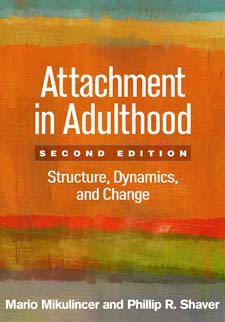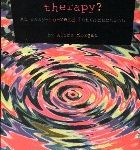Synthesizing a vast body of empirical research and organizing it around a comprehensive conceptual model, this book is recognized as the definitive reference on adult attachment.
The authors explain how what began as a theory of child development is now used to conceptualize and study nearly all aspects of social functioning across the lifespan, including mental representations of self and others, emotion regulation, personal goals and strivings, couple relationships, caregiving, sexuality, psychopathology, psychotherapy, and organizational behaviour.
The origins and measurement of individual differences in adult attachment are examined, as is the question of whether and how attachment patterns can change.
New to This Edition:
- Reflects major advances in clinical practice and research, including thousands of new studies.
- Clarifies and extends the authors’ influential model of attachment-system functioning.
- Cutting-edge content on genetics and on the neural and hormonal substrates of attachment.
- Increased attention to the interplay among attachment and other behavioural systems, such as caregiving and sexuality.
- Expanded discussion of attachment processes in counseling and psychotherapy.
- Additional coverage of leadership, group dynamics, and religion.
Contents:
- I. The Attachment Behavioural System: Normative Processes and Individual Differences
- 1. The Attachment Behavioural System: Basic Concepts and Principles
- 2. A Model of Attachment-System Functioning and Dynamics in Adulthood
- 3. Normative Attachment Processes
- 4. Measurement of Attachment-Related Constructs in Adulthood
- 5. Individual Differences in Attachment-System Functioning: Development, Stability, and Change
- II. Intrapersonal Aspects of Attachment-System Functioning
- 6. Attachment-Related Mental Representations of Self and Others
- 7. Attachment Processes and Emotion Regulation
- 8. Attachment Orientations, Behavioural Self-Regulation, and Personal Growth III. Interpersonal Manifestations of Attachment-System Functioning
- 9. An Attachment Perspective on Interpersonal Regulation
- 10. Attachment Processes and Couple Functioning
- 11. Relations between the Attachment and Caregiving Systems
- 12. Attachment and Sex IV. Clinical and Organizational Applications of Attachment Theory
- 13. Attachment Bases of Psychopathology
- 14. Implications of Attachment Theory and Research for Counseling and Psychotherapy
- 15. Applications of Attachment Theory and Research in Group and Organizational Settings V. Epilogue
- 16. Reflections on Attachment Security Appendices
- Appendix A. Adult Attachment Questionnaire (AAQ)
- Appendix B. Adult Attachment Scale (AAS)
- Appendix C. Attachment Style Questionnaire (ASQ)
- Appendix D. Relationship Style Questionnaire (RSQ)
- Appendix E. Experience in Close Relationships Scale (ECR)
- Appendix F. ECR-R Items
- Appendix G. Experience in Close Relationships Scale (ECR)—Short Version
- Appendix H. ECR-12: A Brief Version of the Experiences in Close Relationships Scale (ECR)
- Appendix I. State Adult Attachment Measure (SAAM)
- Appendix J. Experiences in Close Relationships—Relationships Structure Measure (ECR-RS)
- Appendix K. Caregiving Systems Scale (CSS)
- Appendix L. Caregiving Questionnaire
- Appendix M. Sexual System Functioning Scale (SSFS) References Index
Author Bio:
Mario Mikulincer, PhD, is Professor of Psychology and Provost of the Interdisciplinary Center (IDC) Herzliya in Israel. His research interests include attachment styles in adulthood, terror management theory, personality processes in interpersonal relationships, evolutionary psychology, human learned helplessness and depression, trauma and posttraumatic processes, coping with stress, qualitative research of emotional states, and mental rumination and self-focused attention. Dr. Mikulincer is a Fellow of the American Psychological Society and the Society for Personality and Social Psychology. He is a recipient of Israel’s EMET Prize for Art, Science, and Culture.
Phillip R. Shaver, PhD, is Distinguished Professor Emeritus of Psychology at the University of California, Davis. He has published several books, including Handbook of Attachment, Third Edition, and over 200 journal articles and book chapters. Dr. Shaver’s research focuses on attachment, human motivation and emotion, close relationships, personality development, and the effects of meditation on behaviour and brain. He is a fellow of the American Psychological Association and the Association for Psychological Science and is past president of the International Association for Relationship Research, which honored him with its Distinguished Career Award.






